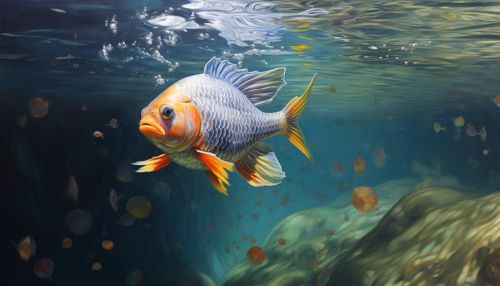The Role of Hormones in Fish Reproduction and Development
Introduction
Fish, as a diverse group of aquatic vertebrates, exhibit a wide array of reproductive strategies. Central to these strategies is the role of hormones, which act as chemical messengers to regulate processes related to fish reproduction and development. This article delves into the intricate hormonal mechanisms involved in fish reproduction and development, highlighting the various hormones at play and their specific roles.
Hormonal Regulation of Fish Reproduction
Fish reproduction is a complex process regulated by a series of hormones produced by the hypothalamus, pituitary gland, and gonads. The hypothalamus secretes gonadotropin-releasing hormone (GnRH), which stimulates the pituitary gland to produce gonadotropins. These gonadotropins, namely follicle-stimulating hormone (FSH) and luteinizing hormone (LH), act on the gonads to stimulate gamete production and release.


Follicle-Stimulating Hormone (FSH)
FSH in fish plays a crucial role in the development and maturation of the ovarian follicles in females and the promotion of spermatogenesis in males. The release of FSH is controlled by the levels of estradiol and inhibin, two hormones produced by the gonads.
Luteinizing Hormone (LH)
LH stimulates the final maturation of the ovarian follicles and the production of progesterone, a hormone necessary for ovulation in female fish. In male fish, LH stimulates the production of testosterone, which is essential for spermatogenesis and the development of secondary sexual characteristics.
Hormonal Regulation of Fish Development
The development of fish from embryos to adults is also regulated by various hormones, including thyroid hormones, growth hormone, and cortisol.
Thyroid Hormones
Thyroid hormones, particularly triiodothyronine (T3) and thyroxine (T4), play a crucial role in the development and metamorphosis of fish. These hormones regulate the transformation of larvae into juvenile fish, a process that involves significant morphological and physiological changes.
Growth Hormone
Growth hormone, produced by the pituitary gland, regulates the growth and development of fish by stimulating protein synthesis and promoting the conversion of food into body tissues. The action of growth hormone is modulated by insulin-like growth factors (IGFs), which are produced in the liver and other tissues in response to growth hormone stimulation.
Cortisol
Cortisol, a steroid hormone produced by the adrenal gland, plays a significant role in fish development. It helps fish to cope with stress and is involved in metabolic processes such as glucose regulation and protein metabolism.
Conclusion
The role of hormones in fish reproduction and development is extensive and complex, involving a multitude of hormones that interact in a finely tuned balance to ensure successful reproduction and development. Understanding these hormonal mechanisms not only provides insights into the biology of fish but also has implications for fish farming and conservation efforts.
